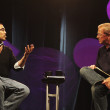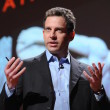Is Atheism Wishful Thinking?
by Fr. Dwight Longenecker
Filed under Atheism

One of the jabs atheists make towards Christians is that our religion is all wishful thinking. They like to blame us for believing in "a sugar daddy in the sky"–a kind of invisible Santa Claus who is going to make everything okay one day. When we die we’ll all go to a happy family reunion and all the nasty stuff will go away. If we hold on tight for a few years here, we’ll just go upstairs for the big party. We are also supposed to believe in a God who answers prayers here below... Read More
An Atheist in Church? Why Christians Should Listen to Their Atheist Neighbors
by Dr. Randal Rauser
Filed under Atheism, New Atheists, The Church

A few years ago I was preparing to debate an atheist on the existence of God at my home church. One lady came up to me, curious about the posters she was seeing advertising the event, and asked about the individual I was debating. “He’s an atheist,” I explained. Immediately her expression tightened and a look of confusion came over her as if to say, “Why would you talk to an atheist?” Forming opinions about the atheist community To be honest, it’s not an unusual reaction.... Read More
The Dogmas and Failure of Rational Atheism
by Carl Olson
Filed under New Atheists

I was recently re-reading sections of what I think is one of the best and yet most under-appreciated Catholic books written in recent decades, Faith and Certitude by Father Thomas Dubay. Fr. Dubay's book is, as the title suggests, especially concerned with skepticism and unbelief, and is an excellent examination of the intellectual premises and varied attitudes held by atheists. In a chapter titled, "Clarifying Our Concepts," Fr. Dubay writes: "Everyone is dogmatic. The statement may startle,... Read More
8 More Keys to the Catholic Environmental Vision
by Kevin Aldrich
Filed under Anthropology, Atheism, The Church

This post will articulate the final eight of fourteen principles that I think underlie the Catholic environmental vision. Part one ended on the thought that the first six principles imply a positive and optimistic attitude toward the natural world, the creator, and the human race. Principle seven, however, is not positive, since Catholicism holds that at the very beginning, something happened which damaged the way man relates to creation. Original sin has disrupted the harmony that ought... Read More
Can Catholics and Atheists Agree on the Environment?
by Kevin Aldrich
Filed under Anthropology, Atheism, The Church

Tomorrow (June 18), Pope Francis will release his long-awaited teaching document on the environment and human ecology. With that in mind, I wrote this article to articulate some principles that underlie the Catholic environmental vision, with the hope that atheists can better understand it and perhaps find common ground. I don’t know if these principles have been set out systematically, but in my research, I have uncovered fourteen. My selection of them is my own, as is the order... Read More
The 6 Varieties of Atheism (and Which Are Most Defensible)
by Dr. Edward Feser
Filed under Atheism, New Atheists

A religion typically has both practical and theoretical aspects. The former concern its moral teachings and rituals, the latter its metaphysical commitments and the way in which its practical teachings are systematically articulated. An atheist will naturally reject not only the theoretical aspects, but also the practical ones, at least to the extent that they presuppose the theoretical aspects. But different atheists will take different attitudes to each of the two aspects, ranging... Read More
Love and the Skeptic
by Carl Olson
Filed under Anthropology, Atheism

"The greatest of these," wrote the Apostle Paul, "is love" (1 Cor. 13:13). Many centuries later, in a culture quite foreign to the Apostle to the Gentiles, the singer John Lennon earnestly insisted, "All we need is love." Different men, different intents, different contexts. Even different types of "love." You hardly need to subscribe to People magazine or to frequent the cinema to know that love is the singularly insistent subject of movies, songs, novels, television dramas, sitcoms,... Read More
How Should We Speak of God? A Response to Daniel Linford
by Thomas M. Cothran
Filed under Atheism, The Existence of God

Last December, an article by Daniel Linford entitled "Do Atheists Reject the Wrong Kind of God? Not Likely" appeared at Scientia Salon. Certain recent "popular books,” according to Linford, have advanced a "mystical" notion of God, arguing that contemporary atheists have directed their disbelief only toward "smaller" conceptions of the divine. Three contemporaries are singled out: Karen Armstrong, John Haught, and David Bentley Hart. On what Linford denominates the "mystical" view, God... Read More
Atheism and the Problem of Beauty
by Joe Heschmeyer
Filed under Atheism, The Problem of Evil

A lot has been said about the “problem of pain.” Why, if God is both loving and all-powerful, is there still suffering in the world? The question is a challenge for Christians, as for all theists.Christians have some sense of why a loving God would permit suffering. It's easy enough to see that love is a good (the highest good, even), and that love requires free will. And it's just a small step from there to see how that free will could be used in some dastardly ways. Likewise, it's... Read More
Atheism and the Personal Pronoun
by Patrick Schultz
Filed under Anthropology, Atheism

The overwhelming majority of atheists today are also materialists. Ousting God implies an evacuation of all things “spiritual,” leaving behind only blind, brute, bits of matter. Whichever one arrives at first—whether materialism or atheism—is really inconsequential; one usually follows the other. Concerning galaxies and stars, materialism seems unthreatening. After all, these are material, natural phenomena that we can understand, explain, and model according to material causes;... Read More






